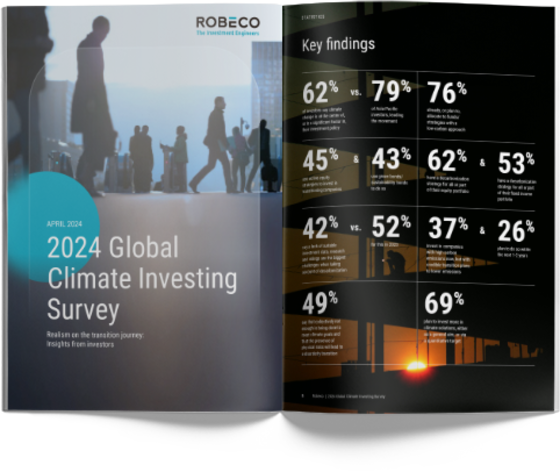

Asia makes huge strides in commitment to climate investing
Investors in the Asia-Pacific (APAC) region have moved ahead of Europeans in making tackling global warming a priority, the fourth Robeco Global Climate Investing Survey shows.
まとめ
- Commitments to climate investing and net zero rise significantly in Asia
- Regional differences also in motivations and perceived headwinds
- Much progress in accounting for emissions and use of engagement
The number of APAC investors for whom climate change is central to, or a significant part of, their investment policy was 79%, rising above Europe (76%) for the first time, and well above North America, where interest has fallen to a new low of 35%.
Even greater enthusiasm is shown in the longer-term aspirations of APAC investors, where 87% said climate investing would be a priority in two years’ time, this time slightly below the 89% of European investors committed to it, but still significantly above the 56% of North Americans for whom it will be significant.

Source (for all graphics): Robeco Global Climate Investing Survey, May 2024.
"One of the key themes this year is the strong progress by investors in the APAC region on climate investing," says Lucian Peppelenbos, Climate and Biodiversity specialist at Robeco. "Investors in this region are embracing investing in climate solutions and in the climate transition, two areas where we see great momentum in the market, in spite of the weakening climate action by political leaders.”
Wide regional differences
It was the first time in the four-year history of the survey of 300 international investors that such wide regional differences in attitudes have become apparent. It is partly thanks to the huge progress seen in Asia – the world’s highest-emitting region where some say the battle to tackle global warming will be won or lost.
It is also due, however, to a backlash against climate investing in North America over the perceived cost to returns of integrating environmental, social and governance (ESG) factors into investments. The slump in climate prioritization brought the global average of investors making climate a priority down from 71% to 62%, though the two-year projection showed an upswing to 77%.
Commitments to achieving net-zero emissions also rose in Asia, with 26% of investors now making a public commitment to decarbonize portfolios by the 2050 deadline, up from 20% in the previous survey. The net-zero commitment has remained stable in Europe at 37% but has fallen further in North America from 19% to 13%.
Greenwashing seen as biggest problem in Asia
There were also regional differences in what investors see as the main headwinds to implementing decarbonization strategies. Challenges around data, research, reporting standards and disclosure have diminished since 2023, along with challenges over accessing expertise and finding suitable products and strategies. But each region had a differing top concern.
In Asia, 40% of those surveyed cited the use of greenwashing to obscure the true impact of investment strategies as the main threat, along with a lack of suitable investment data, research and ratings (also 40%) and a lack of clear reporting standards and disclosures (39%). All were considered slightly less problematic compared with last year.
However, in North America, risk versus return considerations have increased as a challenge, in line with the growing ESG backlash, with 48% citing this as their top concern, up from 40% in 2023. In Europe, the biggest challenge was seen as the data issue – though this has dropped to 48% from 56% last year – while the perceived greenwashing threat also dropped, to 39% from 49%.

Half are now calculating emissions
More than half of investors in Asia-Pacific (52%) have now calculated the carbon footprint of their portfolios, using Scope 1 and Scope 2 emissions data, up from the 45% that had done so in 2023. Similar progress was seen in the number of investors taking steps to gain a forward-looking view on what pathway investee companies are on, and how that aligns with the Paris Agreement, with 45% of APAC investors now doing so compared with 35% in 2023.
And Asia now leads with the number of investors trying to measure Scope 3 emissions, which occur across the entire value chain and are far harder to calculate. Some 38% in APAC are using available data, modeling and best estimates to look at Scope 3, significantly up from 13% last year. This compares with 34% of European investors and just 13% in North America.
Developed markets are still preferred
However, while Asia has shown itself to be the new kid on the block when it comes to prioritizing climate investing, developed markets remain the preferred destination for investment funds, rather than the more nascent emerging markets. The survey showed that 60% of APAC investors have made direct investments via listed securities in commercially mature climate solutions in developed markets compared to 34% in emerging markets – almost identical to the situation in Europe.
The lack of more developed sustainable investing taxonomies in Asia also impacted the figures. Only 20% of APAC investors said they had adopted a sustainable taxonomy to identify and measure climate solutions compared to 44% in Europe, where the EU’s Sustainable Finance Disclosure Regulation (SFDR) and EU Taxonomy have helped to define standards.
Equities rule while green bonds rise
In terms of asset classes, investing in active equity strategies that specifically target allocations to transition-oriented companies remains the favored approach in both APAC and Europe, with 54% following this path. There was slightly more interest in investing in green bonds (52%) in Asia than in Europe (51%), and in transition-oriented fixed income strategies generally (39% vs. 37%).
Finally, the use of active ownership through engagement and stewardship was also more popular in Asia, where 38% said they encouraged external equity managers to adopt climate voting policies, compared to 29% in Europe. Some 38% in APAC said they had partnered with other asset owners to undertake collective engagement on climate issues against 30% in Europe, though in-house engagement capabilities have thus far been weaker in Asia.

Download the publication / レポートのダウンロード

More insights from the Global Climate Survey 2024
重要事項
当資料は情報提供を目的として、Robeco Institutional Asset Management B.V.が作成した英文資料、もしくはその英文資料をロベコ・ジャパン株式会社が翻訳したものです。資料中の個別の金融商品の売買の勧誘や推奨等を目的とするものではありません。記載された情報は十分信頼できるものであると考えておりますが、その正確性、完全性を保証するものではありません。意見や見通しはあくまで作成日における弊社の判断に基づくものであり、今後予告なしに変更されることがあります。運用状況、市場動向、意見等は、過去の一時点あるいは過去の一定期間についてのものであり、過去の実績は将来の運用成果を保証または示唆するものではありません。また、記載された投資方針・戦略等は全ての投資家の皆様に適合するとは限りません。当資料は法律、税務、会計面での助言の提供を意図するものではありません。 ご契約に際しては、必要に応じ専門家にご相談の上、最終的なご判断はお客様ご自身でなさるようお願い致します。 運用を行う資産の評価額は、組入有価証券等の価格、金融市場の相場や金利等の変動、及び組入有価証券の発行体の財務状況による信用力等の影響を受けて変動します。また、外貨建資産に投資する場合は為替変動の影響も受けます。運用によって生じた損益は、全て投資家の皆様に帰属します。したがって投資元本や一定の運用成果が保証されているものではなく、投資元本を上回る損失を被ることがあります。弊社が行う金融商品取引業に係る手数料または報酬は、締結される契約の種類や契約資産額により異なるため、当資料において記載せず別途ご提示させて頂く場合があります。具体的な手数料または報酬の金額・計算方法につきましては弊社担当者へお問合せください。 当資料及び記載されている情報、商品に関する権利は弊社に帰属します。したがって、弊社の書面による同意なくしてその全部もしくは一部を複製またはその他の方法で配布することはご遠慮ください。 商号等: ロベコ・ジャパン株式会社 金融商品取引業者 関東財務局長(金商)第2780号 加入協会: 一般社団法人 日本投資顧問業協会























